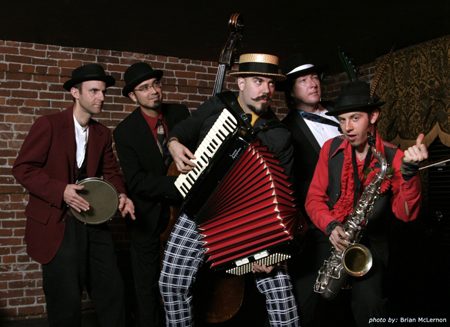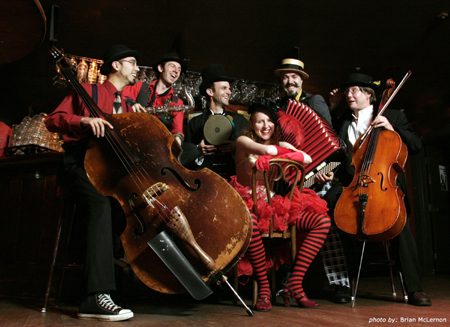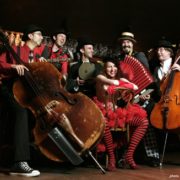BOHEMIANS WHO RHAPSODIZE
A NIGHT AT THE VAGABOND OPERA
 If you like your Opera-Balkan-Arabic-Klezmer music with a touch of nostalgia, a jab of the bawdy, an uppercut of mystery, and a roundhouse punch of impassioned showmanship, and the thought of jumping in a hand-cranked time machine with a sextet of footloose ramblers appeals to you, then leap on board or more accurately, crowd into this medicine show. Like running away with the carnival, Vagabond Opera let’s you peek under the tent flap, sip from their musical elixir, and then allows you to bump to their grind at the cabaret, leaving you a bit wide-eyed and short of breath. This is no sideshow which hints at the bigger things happening under the big top, but a finely tuned showboat that invites you to paddle away from that hum-drum life at the office, follow the siren call and dive into their world, if only for one night. They can be unabashedly absurd, droll and melodramatic, but always keep the art, heart and soul of the music cohesive and tight.
If you like your Opera-Balkan-Arabic-Klezmer music with a touch of nostalgia, a jab of the bawdy, an uppercut of mystery, and a roundhouse punch of impassioned showmanship, and the thought of jumping in a hand-cranked time machine with a sextet of footloose ramblers appeals to you, then leap on board or more accurately, crowd into this medicine show. Like running away with the carnival, Vagabond Opera let’s you peek under the tent flap, sip from their musical elixir, and then allows you to bump to their grind at the cabaret, leaving you a bit wide-eyed and short of breath. This is no sideshow which hints at the bigger things happening under the big top, but a finely tuned showboat that invites you to paddle away from that hum-drum life at the office, follow the siren call and dive into their world, if only for one night. They can be unabashedly absurd, droll and melodramatic, but always keep the art, heart and soul of the music cohesive and tight.
The band cuts a wide swath across as many genres as you think you can remember and more. They boast of a self-described menu that serves up Bohemian cabaret, Parisian hot Jazz , swing, tangos, Ukrainian folk-punk ballads, and “vigorous” originals in addition to the aforementioned Balkan-Arabic-Klezmer repertoire. With 11 languages at their compositional disposal, they can corner the “world” music market in one evening. In fact, there’s one dialect found in Chaplin Nonsense Song that will challenge the most serious polyglot.
Vagabond Opera is composed of six well-trained “uncomposed” musicians. They are Eric Stern (tenor vocals, accordion, piano, and Artistic Director), Jason Flores (bass), Mark Burdon (drums, percussion), Skip von Kuske (cello), Robin Jackson (saxophone, vocals), and Lesley Kernochan (saxophone, soprano and higher vocals).
Tenor and accordionist as well as Vagabond Opera Artistic Director, Eric Stern, paused long enough to sing a different tune in response to inquiries posed before the band stops in the southland for three shows in October.
Folkworks: Since your last tour through the southland, has your presentation been affected by the type of audience who comes to your shows or their response to each number.
Eric: Our show is always changing and we’re always fine-tuning so that the performance evolves. Our model is a theatrical one, so that often, after shows, I or others will have notes and these are based on ideas in the moment, and what works or doesn’t work. We also don’t always do or want to do what the audience wants, as counter-intuitive as that may seem. The idea is to meet people half-way to absorb their energy and conduct it back through our work in the moment, but also to present what we have rehearsed and constructed. It is mostly all palatable if not extremely enjoyable for audiences but we don’t pander; we marry our work to each audience.
FW: Have you added new songs since your earlier visit and how does the band decide on the music that fits in?
Eric: We’ve added several new songs. The band isn’t necessarily a collective so I decide (but yes, in conjunction with the other ensemble members, to a large extent) what works in terms of consistency with the over-all vision. For the most part what people bring to the project has almost always been workable. The real test of a piece is if it works on stage over time.
FW: Do you want to keep the scope of the band’s act within the smaller confines of cabaret style venues or will you go “big” as popularity grows?
Eric: We have already played larger venues and are very adaptable to tailoring our show to the size of the room. Thank you for assuming that our popularity will continue to grow. What I do hope is that we will always play a variety of venues so that we won’t ever lose the small close-up experience. Something is lost and something else gained-it’s a trade-off-in going from small to large. My mentor happened to be Teller (of Penn and Teller) and I grew up watching Penn and Teller’s act grow bigger and bigger. I did miss small works of art like the Miser’s Dream (this is where the magician pulls a multitude of coins from thin air, from people’s ears, coats, etc., amassing an unbelievable amount of currency), but my god, having Teller hang upside-down, straight-jacketed in a water-tank, that’s really something spectacular!
FW: Are you finding that there is a real trend in the pop/rock music scene where bands now showcase non-
traditional musical elements such as opera, old world songs, more obscure instrumentation/arrangements, and theatrics ?
Eric: It depends where you think the pop/rock scene is. With online activity, the stage is ever-shifting, so if you go on myspace, for example, there are many ensembles and bands that have instruments that we haven’t seen in years outside of folk and classical realms, e.g., violins, accordions, cellos, etc. But as for arranging and the operatic and theatrical elements……these are fine art forms and they take real training. So then the question becomes, “Are people leaving music academies and forgoing their training to start or join ensembles that are alternative to the institutional ones?” I don’t think that’s happening. When you study classical or even jazz and especially opera, you are groomed for a very specific purpose, and when you shun that purpose you become shunned. I speak from personal experience. Things are different in the theatrical world, I’ve found.
FW: Is it part of a cycle bringing back the vaudeville/cabaret style of entertainment of a different era to today’s audience?
Eric: We are not trying to bring anything back, but to forge ahead. Our good friend Sol of Amnesia (a venue in San Francisco) has a name for this: Roots Forward. Please don’t get our oldtime costumes confused with the music. Vaudevillian music makes up a VERY small part of what we do. So much of our work is original and operatically and Eastern European based, in a jazz format (i.e. solos are taken, etc.). I often wonder if we’d get called vaudevillian if we had a different look–space suits or giant monkeys or something. Really my main influences are much headier than Vaudeville (and this is in no way meant to denigrate that form): Kurt Weill, Debussy, Cole Porter, Duke Ellington, classical Arabic and Turkish music, a dash of Klezmer (I am Jewish). Jason, our bass player, brings odd meters to the group and a Balkan sensibility. Even Robin’s (Jackson, one of our sax players) music, I’d consider to fall into the category of excellently composed show tunes/cabaret music. The only thing that I would say that goes against the modern grain is that we don’t use instruments that are of an electronic nature. So even though our bassist travels with an electric ‘stick’ upright bass, and we often plug in for acoustic reasons, there are no electronic guitars or beats. And that is solely a choice of mine to have the music be organic. I believe in music stripped down to its essentials, at least when it comes to timbre. Orchestration and arrangements are a different story. Perhaps part of what you mean by the cabaret style of entertainment is that we talk to audiences, and actually put on a show and have through-
lines and comedic elements. I learned that from working with two very good actors who are now part of Second City in Chicago. We develop our acts through rehearsals using Spolin exercises (Victoria Spolin was the pioneer of theater-improv games) and movement exercises. The front-line performers (i.e. the three main vocalists including myself) get together for extra intensive theatrical improv rehearsals. My idea as artistic director is to model this ensemble off of a combination of a classical ensemble, a jazz one, AND a theatrical troupe (where the repertoire is revolving and even lead roles are as well).
FW: Is it also a backlash to the often impersonal digital, sampled, media/corporate-created electronica that now seems to permeate the airwaves.
Eric: I don’t know if it’s a back lash per se, or just our own genuine reaction, my reaction. I like instruments that you can actually play and that have lots of wood or brass in them! I think perhaps audiences may be hungry for something besides lead guitar, rhythm guitar, bass and drums, don’t you? Diction and lyrical intelligibility are also important.
FW: How is the band holding up under the rigors of touring and what else is new?
Eric: So far we’ve gotten better at touring. We feel like a fine-oiled machine, we each have our jobs, and we can usually sense if someone’s moody. If music is first in this ensemble, people are a close second. I have found that no matter the musical situation, what is most important for long-term viability and continuing artistic evolution is that the ensemble members like each other. Our love and trust for each other continues to grow in a positive direction. Here is the magical thing that happens……as our love and trust for each other continues to grow, that married with our work ethic creates a wonderful alchemy and so our love and connection with the audience is ever increasing. Music is a wonderful way to be poly-amorous and our intercourse with our audiences is no small wonder and a very great thrill for both parties, I think. The latest news is that we’ve been picked up a by a very good agency out of San Francisco (Eye for Talent) and so will be taking our act world-wide. We are very much looking forward to presenting our work all over the globe and to meeting more wonderful audiences.
On any given concert night, if the proprietor is backstage adjusting his toupee and the fire marshal is in the parking lot, a hula-hoop, oftentimes set ablaze, can be seen spinning around and about an appropriately dressed burlesque queen. This signifies that you aren’t REM-ing through a dream, but that you bought a ticket on the Vagabond Opera entertainment express and were gladly taken for a ride.
UPCOMING SHOWS:
Tuesday, October 2nd with The Romanovs, at Bordello, 901 E. 1st St. Los Angeles, CA, Show 9pm, 21+, tickets $15.00 in advance and $20.00 at the door. Call: (213) 687-3766. www.bordellobar.com or www.foldsilverlake.com
Thursday, October 4th, at the Coffee Gallery Backstage, 2029 N. Lake, Alta Dena, California, 91001, Show 7:30pm, all ages, tickets $22.50 Call: (626) 398-7917, www.coffeegallery.com
Friday, October 5th with Fishtank Ensemble at Mccabe”s Guitar Shop, 3101 Pico Blvd., Santa Monica, CA, 90405, Show 8pm, all ages, tickets $15 Call: (310) 828-4497, www.mccabes.com
Vagabond Opera has two CDs available: “Get on The Train” and “Vagabond Opera”.
More information at www.vagabondopera.com and www.myspace.com/vagabondopera .{fwURLconvert}
Joel Okida is a struggling artist, struggling writer, and struggling musician. It occurs to him that life is all about the struggle. Fortunately, he did not take up acting. However, he’s not half-bad as a zydeco dancer and the ability to make a mean gumbo and lovely walnut tortes has gotten him by.
BOHEMIANS WHO RHAPSODIZE
A NIGHT AT THE VAGABOND OPERA













